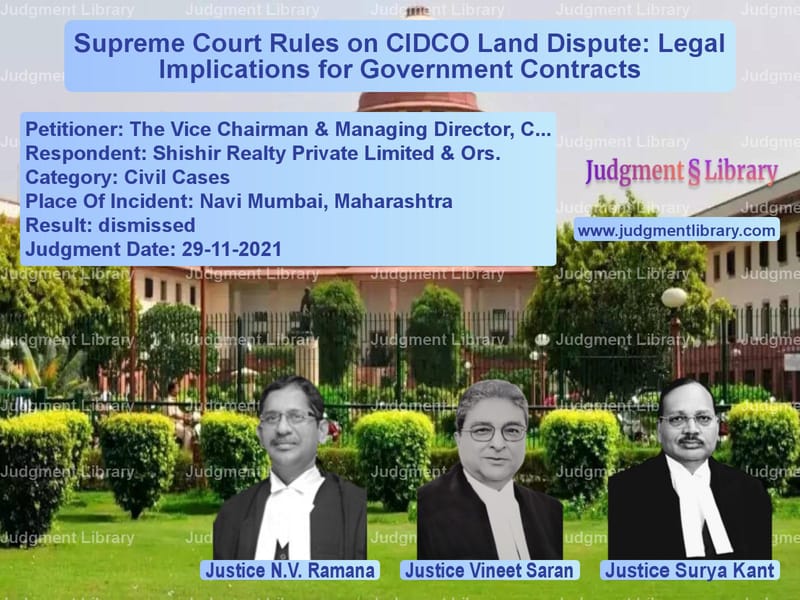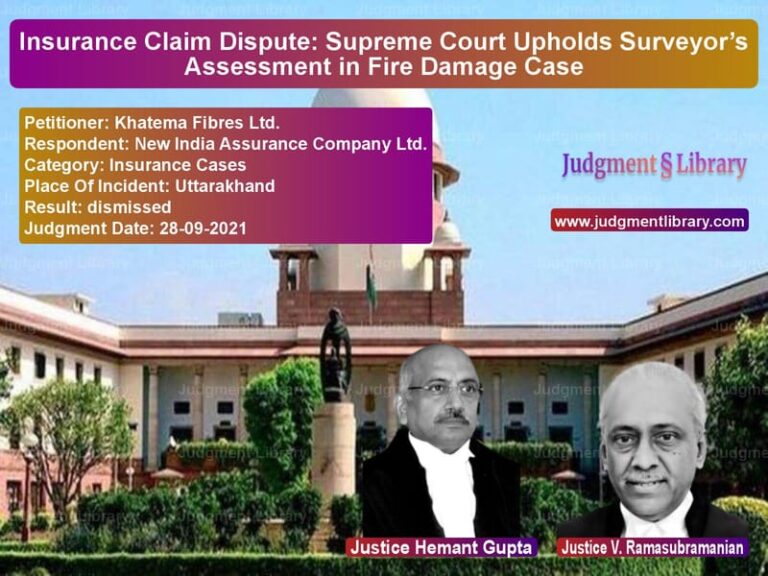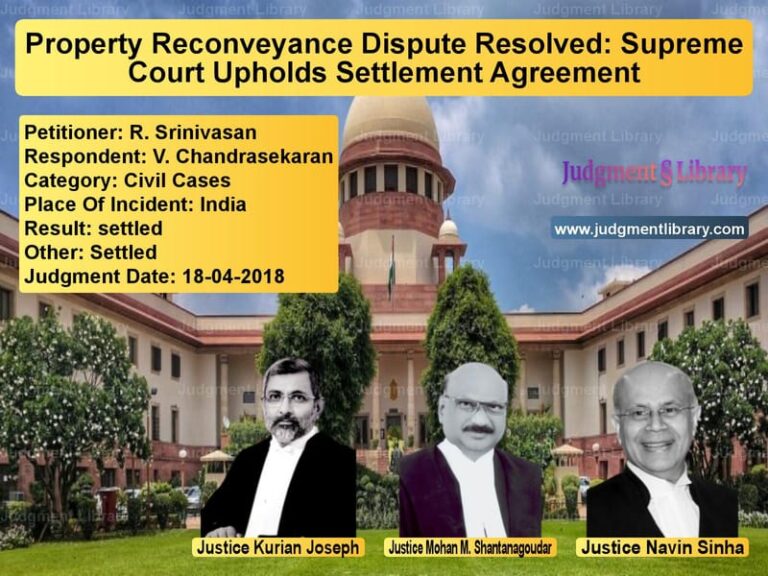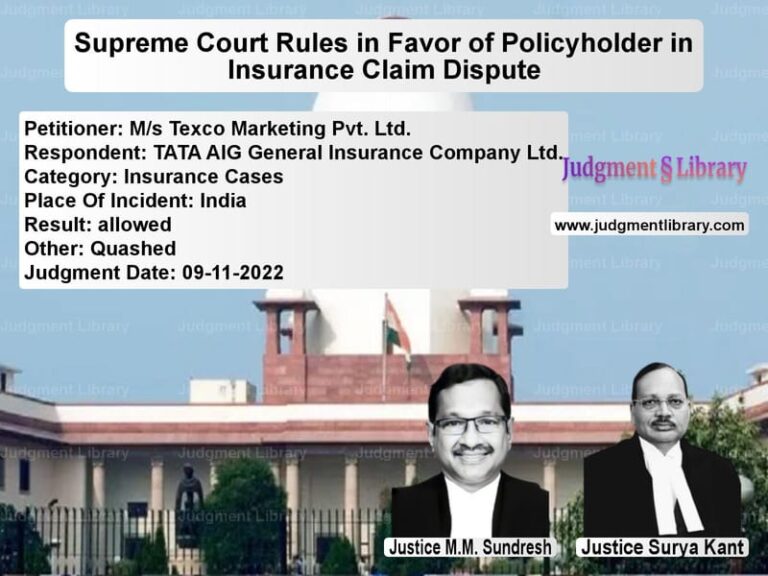Supreme Court Rules on CIDCO Land Dispute: Legal Implications for Government Contracts
The Supreme Court of India, in the case of The Vice Chairman & Managing Director, City and Industrial Development Corporation of Maharashtra Ltd. & Anr. vs. Shishir Realty Private Limited & Ors., delivered a landmark judgment concerning land allotment by CIDCO (City and Industrial Development Corporation of Maharashtra Ltd.). The case primarily revolved around the legality of CIDCO’s decision to cancel land allotments, raising crucial legal questions on promissory estoppel, contractual obligations, and administrative fairness.
Background of the Case
CIDCO, a state-owned planning and development agency, had invited tenders for leasing prime plots of land near Navi Mumbai Airport for the purpose of constructing hotels. Metropolis Hotels Pvt. Ltd., in association with Shishir Realty Private Limited, was declared the highest bidder and was subsequently allotted the land.
After securing the lease, Metropolis Hotels sought approval from CIDCO to modify the designated land use. The request included permission to convert a portion of the land for commercial-cum-residential use. CIDCO granted the necessary approvals, and lease agreements were executed accordingly.
The Dispute and Legal Challenge
Several years later, allegations surfaced that CIDCO had violated the original tender conditions by permitting the conversion of land use. The matter was taken up by the Principal Secretary, Urban Development Department, who conducted an inquiry into the approvals granted by CIDCO.
The inquiry report concluded that the modifications were not in line with the public interest and that CIDCO had acted beyond its powers. Consequently, CIDCO issued show-cause notices and proceeded to cancel the lease agreements, citing irregularities in the approval process.
The affected companies, including Shishir Realty Pvt. Ltd., approached the Bombay High Court to challenge CIDCO’s decision.
Arguments Before the High Court
Petitioners’ Arguments (Shishir Realty Pvt. Ltd.)
- CIDCO had granted approval for the modification of land use through due process, and the lease agreements were lawfully executed.
- The decision to cancel the lease agreements was arbitrary and violated the principle of promissory estoppel.
- Significant investments were made based on the approvals granted by CIDCO, and sudden cancellation caused financial losses.
- Once CIDCO had approved the change in land use and executed the lease, it could not unilaterally cancel the allotment years later.
Respondents’ Arguments (CIDCO & Government Authorities)
- The approvals granted were contrary to the original tender conditions and hence legally invalid.
- The modifications allowed the developers to use the land for commercial and residential purposes instead of hotel construction, defeating the purpose of the allotment.
- The government inquiry found that the land was undervalued due to changes in land use, leading to a loss to the public exchequer.
- The doctrine of public interest overrode contractual obligations, giving CIDCO the authority to revoke approvals.
Bombay High Court’s Ruling
The Bombay High Court ruled in favor of Shishir Realty Pvt. Ltd., holding that CIDCO’s actions were arbitrary. The court emphasized:
“Once a statutory body has granted approvals through due process and executed binding lease agreements, it cannot retrospectively cancel them on vague grounds of public interest.”
Following this ruling, CIDCO challenged the High Court’s verdict before the Supreme Court of India.
Supreme Court’s Analysis and Ruling
1. Applicability of Promissory Estoppel
The Supreme Court examined the doctrine of promissory estoppel in government contracts. It observed:
“Where a government entity makes a clear and unequivocal representation, inducing a private party to act on it, it cannot arbitrarily withdraw from its commitment unless overriding public interest is demonstrated.”
The Court ruled that CIDCO could not cancel the lease agreements after having actively approved them.
2. Legality of CIDCO’s Decision
The Court analyzed whether CIDCO had the legal authority to revoke approvals. It noted that CIDCO had previously permitted similar modifications in other projects. The Court held:
“The principle of equal treatment requires that similar cases be treated alike. CIDCO’s decision to selectively cancel this allotment, while approving others, was discriminatory.”
3. Public Interest vs. Contractual Rights
The Court acknowledged that public interest considerations are paramount but cautioned against their misuse:
“The government cannot invoke vague notions of public interest to arbitrarily annul contracts that were lawfully executed.”
It ruled that CIDCO failed to provide substantial evidence proving that the lease modification harmed public interest.
4. Government’s Responsibility in Bidding Processes
The Court reaffirmed the importance of adhering to transparent procedures in government allocations:
“Public entities must ensure procedural integrity in tenders and subsequent modifications, preventing post-facto interference that undermines business confidence.”
Final Judgment
The Supreme Court ruled:
- CIDCO’s cancellation of the lease agreements was invalid.
- The Bombay High Court’s ruling in favor of Shishir Realty Pvt. Ltd. was upheld.
- CIDCO must honor the existing lease agreements and allow the developers to proceed with their projects.
- Any future modifications in land use policy must be applied uniformly and transparently.
Impact of the Judgment
This ruling has significant implications:
- Strengthens Promissory Estoppel: Government bodies must uphold commitments made to private parties.
- Limits Arbitrary Cancellations: Public authorities cannot cancel contracts without clear legal justification.
- Ensures Business Stability: Encourages investor confidence in public-private projects.
- Reinforces Government Accountability: Mandates transparency in land allocations.
Conclusion
The Supreme Court’s ruling in The Vice Chairman & Managing Director, City and Industrial Development Corporation of Maharashtra Ltd. & Anr. vs. Shishir Realty Private Limited & Ors. reinforces the legal sanctity of government contracts. It ensures that state entities cannot arbitrarily revoke agreements after deriving benefits from them. This decision sets a critical precedent for future disputes concerning land allocation and public-private agreements.
Read also: https://judgmentlibrary.com/supreme-court-upholds-keralas-forest-land-vesting-popular-estates-case/
Petitioner Name: The Vice Chairman & Managing Director, City and Industrial Development Corporation of Maharashtra Ltd..Respondent Name: Shishir Realty Private Limited & Ors..Judgment By: Justice N.V. Ramana, Justice Vineet Saran, Justice Surya Kant.Place Of Incident: Navi Mumbai, Maharashtra.Judgment Date: 29-11-2021.
Don’t miss out on the full details! Download the complete judgment in PDF format below and gain valuable insights instantly!
Download Judgment: the-vice-chairman-&-vs-shishir-realty-priva-supreme-court-of-india-judgment-dated-29-11-2021.pdf
Directly Download Judgment: Directly download this Judgment
See all petitions in Contract Disputes
See all petitions in Property Disputes
See all petitions in Landlord-Tenant Disputes
See all petitions in Specific Performance
See all petitions in Damages and Compensation
See all petitions in Judgment by N.V. Ramana
See all petitions in Judgment by Vineet Saran
See all petitions in Judgment by Surya Kant
See all petitions in dismissed
See all petitions in supreme court of India judgments November 2021
See all petitions in 2021 judgments
See all posts in Civil Cases Category
See all allowed petitions in Civil Cases Category
See all Dismissed petitions in Civil Cases Category
See all partially allowed petitions in Civil Cases Category







